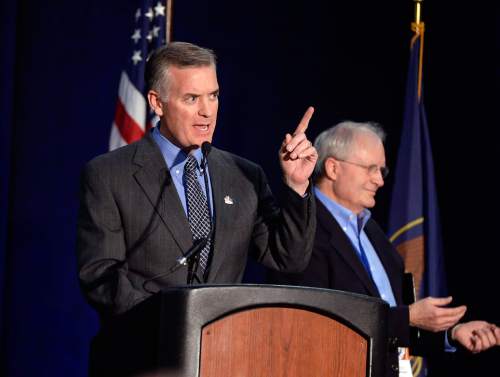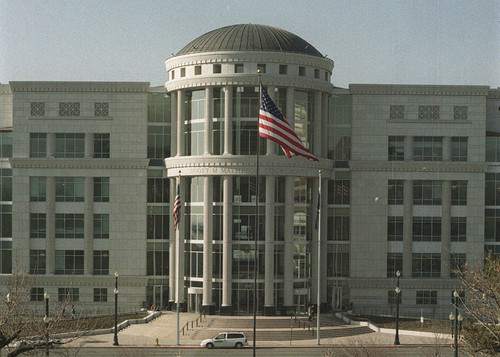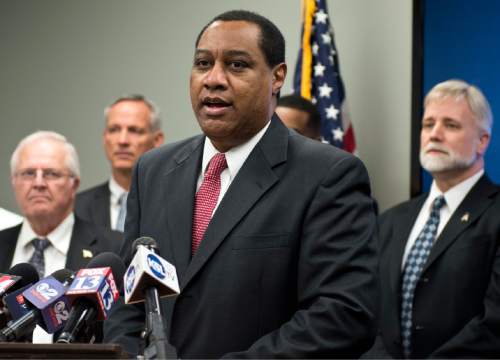This is an archived article that was published on sltrib.com in 2016, and information in the article may be outdated. It is provided only for personal research purposes and may not be reprinted.
The Utah Supreme Court dealt another setback to the Utah Republican Party on Friday, ruling that candidates for office can indeed choose to gather signatures to secure a spot on the primary election ballot.
The state GOP had contended that the statute gives the party the option of deciding whether candidates seeking the nomination would gather signatures, attend the party's nominating convention or both.
The GOP is attempting to recognize only those candidates who go through the party's conventions this month.
But the court ruled that "there is no ambiguity" in the statute, which allows a member to choose how to seek the nomination and wrote that the Republican Party's argument "simply ignores the structure of the statutory language."
Supporters of the signature gathering hailed the ruling as a victory for democracy.
The high court also declined to consider an attempt by the Utah Democratic Party to have the state elections office revoke the GOP's status as a qualified political party. Democrats had argued that because the Republicans have threatened to disqualify candidates who only gather signatures to run for office, the GOP is not complying with the law and should be disqualified.
The court ruled, however, that until the party does act against a signature-gathering candidate, the threats alone do not warrant action by the court.
"If the Republican Party chooses otherwise, perhaps by actually ejecting a member from the party, there may emerge an actual injury, conveying standing to seek relief in an appropriate forum," the court held. "In the meantime there is no controversy ripe for resolution, and no basis for mandating future actions by the lieutenant governor."
The Supreme Court's decision comes after a ruling Wednesday by U.S. District Judge David Nuffer that rejected the GOP's contention that the number of signatures Utah House and Senate candidates were required to gather were so onerous that they are almost impossible and are unconstitutional.
Nuffer ruled that, while the signature targets would probably be unconstitutional on their own, as long as candidates also have the option of going to the party's convention, there is a constitutional alternative in place. The signature path only expands ballot access — "Icing on the cake," as attorneys for the state argued.
There is one more component of the Republican Party's lawsuit pending: Nuffer has a hearing scheduled next week for arguments on the extent to which the party can control its membership.
The Republican Party contends the law says candidates must be a member of the party, and in order to be a GOP member, party officials are requiring candidates to sign pledges to abide by the GOP rules and bylaws — which require candidates to seek the party's nomination at the nominating conventions.
Utah Republican Party Chairman James Evans has said that, if Nuffer rules in the party's favor, the GOP would likely seek to disqualify candidates who don't get at least 40 percent of support from delegates at the nominating convention.
The string of litigation stems from the Legislature's passage of SB54 in 2014, a revamp of state election law. The changes were part of a compromise with the group Count My Vote, led by well-connected Utah politicos, which had pushed for a ballot initiative to do away with party conventions and nominate candidates through primary elections.
The group argued that conventions cater to the most strident in both parties, depress voter turnout, and produce candidates that don't represent mainstream Utahns.
It abandoned the initiative when lawmakers agreed to pass a dual-track nominating process with the conventions and signature gathering to winnow down the primary field.
But the law drew opposition from Republican Party leadership and months of lawsuits as the party argued the state should not be able to tell the party how to pick its candidates.
Rich McKeown, co-chairman of Count My Vote, said the group "celebrates the ruling," which he added "clearly confirms that the people of Utah, not political parties, determine who has a voice in our elections."
Utah Democratic Party Chairman Peter Corroon said that, with Nuffer's ruling earlier in the week and the Supreme Court ruling Friday, "it has certainly been a good week for democracy in Utah."
"The Utah Supreme Court and a federal court have now upheld the validity of SB54 and the will of the people of Utah for a more open elections process," Corroon said. "We hope this decision will encourage the Utah Republican Party leadership to finally stop circumventing the will of the state Legislature, the courts and the people of Utah, and allow the elections process to move forward according to state law.
Evans, the GOP chairman, said the ruling is not surprising, given the justices' statements during the hearing, but he is looking ahead to the next hearing in federal court.
"What it does do is bring into focus the end game for us, which is the federal court to rule on the constitutionality of membership definitions, and we believe we're on very strong grounds on that," Evans said. "Ultimately, it's the political party that decides who their members are and by extension who can be a Republican candidate, so you have to meet our membership requirements to be a Republican candidate, and our membership requirement is you have to go through our convention."
Twitter: @RobertGehrke







